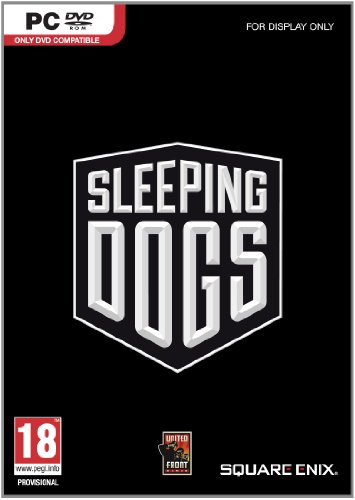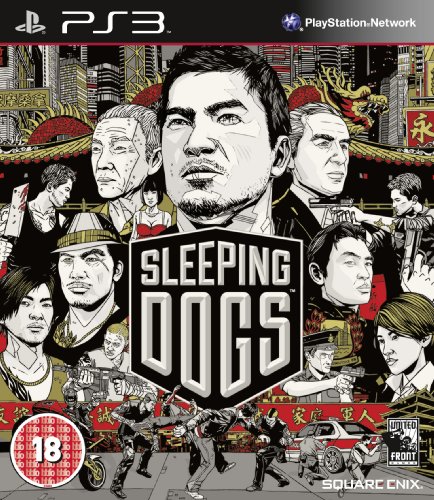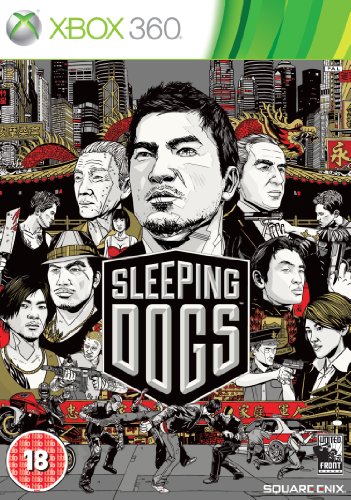Product Features
- Genre
- Role Playing
- Publisher
- Square Enix
- Release Date
- August 17, 2012
- Available Platforms
- PC, PlayStation 3, XBox 360
Related Items
Sleeping Dogs
Sleeping Dogs catapults players into the role of undercover cop Wei Shen, tasked with taking down one of the world's most fearsome criminal organisations from the inside the Hong Kong Triads.As players explore the bustling and crowded Hong Kong island, through its neon-lit side streets and sprawling street markets, an incredible story unfolds of loyalty and betrayal, where Wei begins to question his own motives as he is sucked in deeper than he could ever imagine.Offering players an island packed with action, every street corner, market stall, harbour dock or city skyscraper can become an opportunity for intense shoot-outs, adrenaline-fuelled street races and intense, brutal martial arts combat.Featuring one of the most intuitive and imaginative combat systems, Sleeping Dogs empowers players...
-
Dave Wallace January 18, 2013 PS3
Spare a moment of sympathy for poor Wei Shen, the protagonist of Sleeping Dogs. Wei Shen is a cop. Not only that, but he's a cop who's working undercover. Not only that, but he's a cop who's working undercover whilst also trying to do his normal cop work on the side. And not only that, but he's an undercover cop who's becoming further and further embroiled in the seamy underbelly of the crime-ridden metropolis of Hong Kong, getting involved with the Triads, and running from many of his own police colleagues who are unaware that he's secretly one of the good guys. Just how much stress can a single video-game character take?
Luckily, what would make for an incredibly stressful life also makes for an incredibly entertaining video game.
Sleeping Dogs - originally intended as part of the "True Crime" series, before later being spun-off into its own thing - is an open-world free-roaming crime game in the same mould as the Grand Theft Auto franchise. But whilst it shares a lot in common with the GTA games, it has a lot of unique features that help it to stand as far more than a mere imitator of Rockstar's popular series.
Let's get the similarities over with first: like GTA, Sleeping Dogs is based around individual missions that all form part of a larger story. You can choose whether to pursue these missions or explore the world of the game 'sandbox' style: ie. running around and doing whatever you want with the various weapons and cars at your disposal (well, until the police catch up with you, anyway). With on-screen meters to help you keep track of your cash and health - as well as a helpful mini-map in the bottom corner of the screen to enable you to get your bearings - you can roam the streets instigating all sorts of violent and criminal acts, should you so desire. Or, if you're a bit more self-disciplined, you can report to one of several markers on the map where you'll be given instructions on how to proceed with your next task, helping the game's larger story to unfold.
So far, so GTA. But where Sleeping Dogs mixes things up a little bit is with the finer control systems it employs for things like fighting and free-running, as well as with the wider story of the game - which is more complex and interesting than you'd expect for this type of title.
The fighting flows a lot better than GTA thanks to a simple-but effective fighting mechanism that only uses a couple of buttons, but relies on some fairly precise timing to get results. It's a little like the fighting mechanics used in the Batman Arkham Aslyum games: you press 'square' to land punches and kicks, and you can use 'circle' to grapple with the bad guys and drag them around. 'Triangle' allows you to counter certain attacks (the enemies flash red just beforehand, giving you a split-second to react), whilst there's also an option to use certain objects in your immediate environment to finish your enemies off. For example, if you grapple with an enemy near a phone booth or dumpster, the object will flash red, meaning you can drag your unfortunate victim over towards it and smash them into it. This is especially fun with larger objects like the ceiling-high fish tanks in the local nightclub, which explode with gallons of water when you sling villains into them and crack the glass.
And the free-running aspect - which borrows a little from games like Assassin's Creed and Mirror's Edge - encourages you to be a bit more active when pursuing people on foot (or equally, when escaping from the cops). Whilst it might amount to little more than holding down 'X' to run, and then tapping the same button at critical points to leap over obstacles or climb walls, it still offers a little more control and interaction than I've seen in a lot of these kinds of games. There are also surprise quick-time-events (QTEs) that require you to tap buttons quickly when prompted, in order to overcome certain problems (such as when you're about to be handcuffed by the police, and have only seconds to escape).
As for the story, the 'undercover cop' angle turns out to be an inspired one, piling the pressure onto Wei Shen (who turns out to be a pretty complex, multi-layered character) whilst also providing a justification - albeit a slightly thin one - for all the criminal activity you undertake. Rather than simply being due to out-and-out criminality on your part, you can argue that it's all under the guise of maintaining Wei Shen's cover in service of a greater good. Although as I indicated earlier, most of the cops in Hong Kong aren't aware that you're secretly on their side, meaning that you have to fight the police as often as you aid them.
This dual aspect of the character also allows for a fair amount of variety in terms of the missions you're called on to complete. Whilst a lot of them are standard low-level criminal fare - collecting protection money, muscling in on other guys' territory, fighting a few hoods or intimidating rival drug dealers - there's also quite a bit of police work to undertake. For example, an early police mission involves tracking the supply of drugs by getting close to the dealer, finding out where he's getting his goods from, and then hacking into local surveillance cameras to gather evidence on the chain of supply (and the hacking itself is done through a simple but fun mini-game that forces you to use logic to hack a PIN code combination - just one of many little touches that help keep the missions fresh and interesting). And as you get further into the game, these missions become more complex and involved, with higher stakes and more complicated objectives to complete, pitched at a learning curve that's just steep enough for you to always feel like you're being challenged.
Enhancing the core gameplay are a few little point-scoring mechanisms that allow you to channel your experiences into new, unlockable abilities. Your 'face' meter shows you how much respect you have among the criminal community - and this can be enhanced in all sorts of ways, including pulling off particularly slick attacks on rival gangs. And you can gain experience points from your activities that allow you to unlock both 'police' and 'Triad' skills, giving you access to a new ability each time you earn enough points to level-up.
Finally, this game is also noteworthy for the amount of content that its developers are continuing to generate for it even several months after its release. As well as the usual kind of throwaway cosmetic downloadable content (DLC) - such as extra clothing and vehicles - there are already two complete add-on episodes available that extend the game into new arenas. One is a supernatural tale of ghosts and urban legends, whilst the other revolves around an offshore fighting tournament (inspired by 1970s kung-fu flicks in the Bruce Lee mould). Whilst you do have to pay extra for many of these DLC extras, they're pretty competitively-priced, and it's nice to see developers Square Enix continue to put the effort in to give you as much entertainment value as possible from this game.
Hopefully my review has given you a flavour of Sleeping Dogs without giving too much away about it. Essentially, what could have been a straightforward GTA rip-off is enhanced by some finely-tuned gameplay mechanics and an exotic location that helps to set it apart from its rivals in the free-roaming crime-simulator genre. Topped off with some pretty high-calibre voice acting - the likes of Lucy Liu, Emma Stone and Tom Wilkinson all contribute their vocal talents here - and some lovably distinctive characters (Mama Chu, in particular, is great fun), this is a much better game than I had any right to expect it to be, and I wouldn't be surprised if it marked the beginning of a franchise that could give GTA a serious run for its money in future. -
George Orton September 21, 2012 360
"Grand Theft Auto in Hong Kong" is how most people have described Sleeping Dogs. And at first glance, a GTA clone is exactly what the game appears to be: an open-world crime game with a core mission-based storyline that provides a skeleton upon which to hang loads of extra side-challenges and free-roaming fun. However, when you start to examine the game's mechanics a little more closely, you begin to realise that the developers have drawn from more than just one A-list inspiration to create a mash-up of recent videogame greats, but one that also stands on its own as a distinctive property.
Whilst the basic concept of the game will certainly feel very familiar to GTA fans, many of the gameplay details are quite different. Most notably, the game's hand-to-hand combat system feels more in line with the free-flowing fighting mechanics that we've seen in recent titles like Batman: Arkham City than the clunky and simplistic controls of GTA. As it turns out, the combat system is a very important facet of Sleeping Dogs - as I suppose you'd expect, given the obvious Hong-Kong-cinema-style martial-arts influences on the game - and it immediately helps to really set it apart from the GTA series.
As well as the combat mechanics, the way you move around the city feels quite different to GTA, too. If anything, it has more in common with the fast-moving free-running style of the Assassin's Creed series, giving you a greater sense of interaction with the immediate scenery (which is beautifully rendered in all its exotic, oriental glory). Other touches evoke the stylised world of Max Payne (especially the slow motion shooting sequences - John Woo, eat your heart out!), whilst the game's larger storyline - involving undercover cops and the various machinations of the Hong Kong underworld - is reminiscent of the complex crime drama of the Yakuza series.
As you might have guessed from the previous paragraphs, Sleeping Dogs feels like something of a Frankenstein's-monster of a game, made up of the best bits of other popular titles. But in bringing all these elements together, it manages to create its own distinct flavour - and I can't help but feel that its creators should be commended for introducing a new property to the crowded marketplace rather than yet another sequel or reboot of an existing franchise.
So what makes this merely a four-star game rather than a perfect one? Well, for one thing there's a sense that the larger storyline of the game is a little rushed. Quite a lot happens over the course of the game - with some quite complex plotting at times - but developments are rushed through quickly rather than truly given enough time to sink in. It's sometimes hard to keep track of exactly who all the main players are and where their allegiances lie at any given time, often making the game's story as confusing as it is compelling. By compressing so much story into such a small space, the game certainly feels like it moves at a breakneck pace, but one that occasionally comes at the expense of clarity.
There are also minor elements of the game (such as some of the voice-acting, or the mission concepts) that seem to lack a little inspiration and polish. Not so much that it becomes a distraction, but just enough to give the impression that a little more finesse could have made this a perfect gameplaying experience, rather than just a really good one. And whilst my last complaint is probably quite a personal one, there are a few too many RPG-style elements (like changing clothes, earning experience points to enhance your abilities, or having your decisions influence whether you lean more towards being a good cop or an evil criminal) cluttering up what could have been a more streamlined, action-oriented adventure.
Still, the successful way in which this game mashes-up some of the best bits of other existing titles - as well as the fact that prices already seem to be dropping for such a new game (as you can see from the results below) - make Sleeping Dogs well worth a punt, especially for those cold-turkey GTA fans who can't wait for the next instalment of that franchise. And - whisper it - there's even a sense that Rockstar Games might take some hints from Sleeping Dogs as it fine-tunes the upcoming GTA V.
-
 Sleeping Dogs: Story Trailer
360PS3PC | 02:08
Play Trailer
Sleeping Dogs: Story Trailer
360PS3PC | 02:08
Play Trailer


